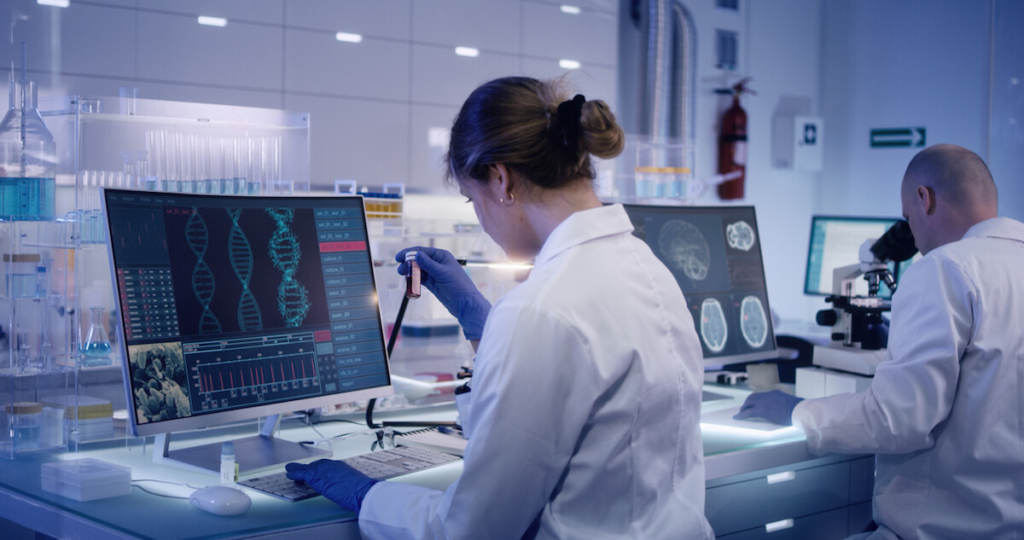In the fast-paced world of biomedical research, an innovative field known as bioinformatics is making waves. This interdisciplinary field combines biology, computer science, and information technology to analyze and interpret complex biological data. In this article, we will explore the exciting world of bioinformatics and how it is revolutionizing the way we conduct research in the life sciences.

Bioinformatics:
Bioinformatics is the application of computer technology to the management and analysis of biological data. It involves the use of algorithms and statistical tools to make sense of vast amounts of genetic, genomic, and proteomic data. By harnessing the power of computers, bioinformaticians can uncover hidden patterns, relationships, and insights in biological data that would be impossible to detect by traditional means. Dayhoff is known as the founder of bioinformatics. This she did by pioneering the application of mathematics and computational techniques to the sequencing of proteins and nucleic acids and establishing the first publicly available database for research in the area.
Advertisement-1 For PRODUCTS, INSTITUTION, UNIVERSITY & COMPANY PROMOTION, Email to mgsdigitalsolutions@gmail.com
How does Bioinformatics Work?
Bioinformatics relies on powerful computational tools and databases to process and analyze biological data. These tools include sequence alignment algorithms, phylogenetic analysis software, and protein structure prediction tools. By using these tools, bioinformaticians can compare genetic sequences, predict the function of proteins, and identify potential drug targets. This information is crucial for advancing our understanding of complex biological processes and developing new treatments for diseases.
Why is Bioinformatics Important?
Bioinformatics plays a critical role in advancing biomedical research and personalized medicine. By analyzing large datasets of genetic information, researchers can identify genetic variations that are associated with disease risk, drug response, and other health-related traits. This information can be used to develop targeted therapies and interventions that are tailored to an individual’s unique genetic makeup. In addition, bioinformatics is essential for studying complex biological systems, such as the human microbiome, and understanding how genetic and environmental factors interact to influence health and disease.
The Future of Bioinformatics
As technology continues to advance, the field of bioinformatics is poised for even greater growth and innovation. Researchers are exploring new applications of bioinformatics, such as predictive modeling, machine learning, and artificial intelligence, to address pressing challenges in healthcare and biotechnology. By harnessing the power of big data and cutting-edge computational tools, bioinformaticians are paving the way for groundbreaking discoveries and advancements in the life sciences.
Career Opportunities: If you are planning to pursue a Bioinformatics degree, your future career prospects can be promising. The demand for these professionals is on the rise, offering numerous career options in academia, healthcare, biotechnology, and pharmaceutical industries. Bioinformatics is applied in various areas like molecular medicine, personalized medicine, preventative medicine, gene therapy, drug development, waste cleanup, climate change studies, alternative energy sources, biotechnology, antibiotic resistance, forensic analysis of microbes, bio-weapon creation, and crop.
Advertisement-2 For PRODUCTS, INSTITUTION, UNIVERSITY & COMPANY PROMOTION, Email to mgsdigitalsolutions@gmail.com
In conclusion, bioinformatics is a dynamic and rapidly evolving field that is revolutionizing the way we conduct research in the life sciences. By combining biology, computer science, and information technology, bioinformatics is unlocking the mysteries of the genetic code and transforming our understanding of complex biological systems. As we look towards the future, bioinformatics will continue to play a crucial role in advancing biomedical research, personalized medicine, and healthcare innovation.
For more about careers in Biomedical Engg. areas, visit on http://www.icareerkick-mgs.in
Your point of view caught my eye and was very interesting. Thanks. I have a question for you.
Thanks for sharing. I read many of your blog posts, cool, your blog is very good.